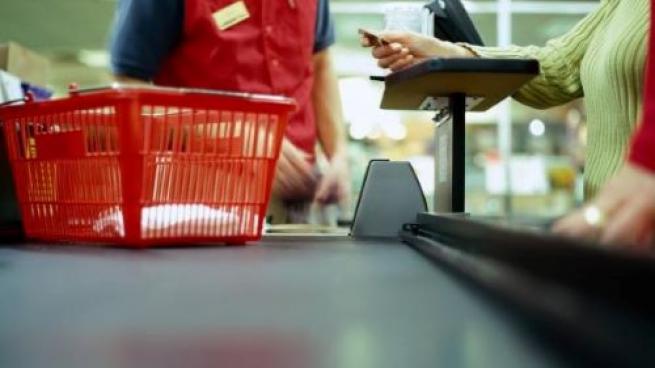Conveyor Belts Move the Checkout Experience Forward

Coated for Cleanliness
Certainly, COVID-19 has brought the importance of sanitation to the fore and provided an even greater impetus for grocers to button up sanitary practices across their operations. Grocers are also demonstrating their commitment to shoppers in a visible way, from protective shields installed at checkout areas to stalls of pre-sanitized carts.
Even before the coronavirus emerged, Mol Belting was working on greater checkstand sanitation. About seven years ago, the company began exploring technologies to treat belts with a sanitizing compound, after assessing the results of a checkstand sanitation study from former Michigan State University microbiologist Dr. Zhinong Yan.
“Dr. Yan found that high microbial populations were present in 100% of the samples collected from checkstand conveyor belts in grocery stores, but no foodborne pathogens,” explains Hathaway. “He concluded that more stringent sanitation practices are necessary in the retail checkstand environment.”
According to Mol, the emergence of COVID-19 injected a new need and urgency into belt sanitation. “Viruses are a whole other thing,” he observes. “Viruses are not technically alive, but they are replicable, and that is a problem.”
As its past research and current COVID-19 events coincide, Mol Belting is launching a new Molchem technology and product line that includes coated checkstand belts and other products designed for surfaces and personal hygiene. Its multilayer PVC conveyor belt has been treated with a compound comprising a surface hardener, liquid polyurethane, and an antimicrobial agent approved by the U.S. Food and Drug Administration and registered with the U.S. Environmental Protection Agency. The belt is designed to be scratch-resident and easy to clean.
To accompany the coated belt, Mol Belting offers a checkstand and belt multipurpose cleaner that also can be used on other surfaces like metal, plastic, stainless steel and shopping carts, among other areas within a store. This cleaner is proven effective on bacteria and viruses compared with other cleaners that aren’t designed for conveyor surfaces, and that can negatively affect belt material.
As part of its complete sanitary system, the pros at the Molchem brand recommend first cleaning debris between the belt and conveyor strikeplate, spraying with the belt cleaner, wiping the area using a lint-free cloth and/or cleaning pad, and coating the surface of the coated belt with an antimicrobial coating like Molchem’s Biotrexx 247. To confirm and track cleaning from checkstand to checkstand and store to store, grocers can use an app that was developed for the Molchem brand, with a detailed dashboard and accessible data.
Extending the cleaning technology to a personal level, the company has also developed a new hand purifier. The product is different from traditional hand sanitizers in that it extends protection for hours and is nontoxic and nonflammable. It will be available in a 2-ounce foaming pump bottle, an 8-ounce foaming pump bottle, a 1-gallon jug, a 5-gallon pail and a 55-gallon drum. Mol Belting also offers Molchem hand purifier stations in a floorstand station format, which is currently in use at Harding’s Markets in Michigan.
Phil Lempert, a food industry analyst and author, has partnered with Mol Belting to share the benefits of the Molchem technology with the grocery industry. According to Lempert, the trends of the pandemic — especially the expectation for cleanliness — will continue in the long term. “As the pandemic slowed down, some people got sloppy. Now, with the Delta variant, there’s no question that consumers want a clean, safe store and want it to align with their values,” Lempert notes, adding that retailers are — and should be — addressing such needs and demands. “It sends a message that ‘I, as a retailer, care about you,’ and Molchem is bringing attention to front end sanitation.”
Lempert also underscores the convergence of the shared values of health and wellness and sustainability among today’s consumers, noting that Mol Belting has developed a DC motor that uses 78% less power than a traditional AC motor and can be run with no oil. The motor will be available in early 2022.
progressivegrocer.com

